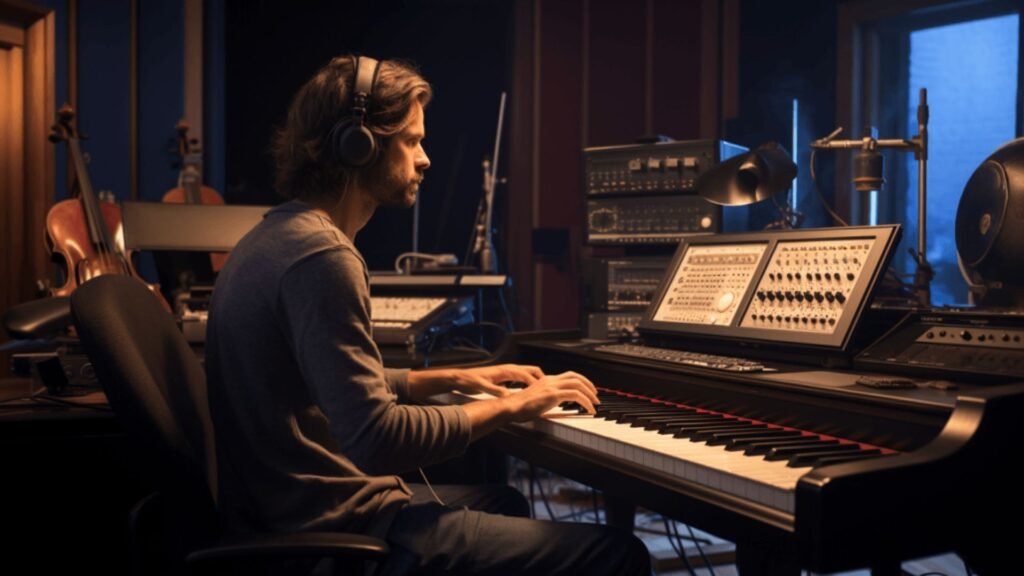The Role of a Composer in Film Soundtracks
Film soundtracks are an essential part of the movie experience. The music, often carefully crafted and intertwined with the visuals, can heighten emotions, underscore important moments, and even become a character in its own right. At the heart of creating these unforgettable scores is the composer. Composers for film play a pivotal role in shaping the audience’s emotional journey, and their work is often one of the key elements that elevate a film from good to great. In this article, we’ll explore the role of a composer in film soundtracks, the process they follow, and how their music contributes to the overall impact of a film.

Setting the Emotional Tone
One of the primary functions of a film composer is to set the emotional tone of the film. Music can communicate emotions that visuals alone might not fully express, such as tension, joy, sadness, or fear. The composer’s job is to understand the underlying emotional pulse of the movie and create a soundtrack that reinforces it.
- Example: In John Williams’ score for Jaws, the iconic two-note motif instantly conveys a sense of impending danger. The simple, yet ominous sound is enough to elicit anxiety, setting the tone for the suspenseful thriller.
- Example: In Hans Zimmer’s score for The Lion King, sweeping orchestral arrangements mirror the grandeur of the African savannah and evoke feelings of hope and adventure.
Creating Musical Themes and Leitmotifs
Many film composers create recurring musical themes or leitmotifs that represent specific characters, locations, or concepts. These motifs help anchor the film’s narrative and allow the music to act as a subconscious guide for the audience.
- Example: In Star Wars, John Williams’ iconic main theme for the film’s hero, Luke Skywalker, returns throughout the series in different variations, signaling Luke’s evolution and his connection to the Force.
- Example: In The Lord of the Rings, Howard Shore uses different themes for the key locations (e.g., the Shire, Gondor, Mordor), and for the characters (e.g., the gentle theme for Frodo and the dark, brooding theme for Sauron).
These musical themes can be altered to reflect changes in a character’s journey or to emphasize important narrative shifts.
Enhancing Visual Storytelling
A composer’s job isn’t simply to write music that sounds good; it’s to write music that enhances the visual storytelling. The music needs to complement, not overpower, the images on screen, helping to build atmosphere, guide pacing, and underscore key narrative beats.
- Example: In The Dark Knight, Hans Zimmer’s score reflects the psychological tension of Gotham City. The music’s urgency and complexity mirror the chaos of the city, while its aggressive tone underlines the morally ambiguous themes of the film.
- Example: In Inception, Zimmer uses a recurring theme built around a slowed-down version of nonet, a song by composer Edith Piaf, to create an underlying feeling of loss and disorientation, enhancing the dream-world premise.
Composers are particularly adept at syncing their music with key moments in a film, like an emotional climax, the resolution of a conflict, or a dramatic twist. A well-timed musical cue can make these moments feel far more impactful.
Building Atmosphere and Setting
A film score can do more than just convey emotion—it can create the world of the film. Whether it’s the vast expanse of space in a sci-fi epic or the intimate setting of a romantic drama, the music helps to build and solidify the atmosphere.
- Example: In Blade Runner, Vangelis’ synthesizer-driven score creates a dystopian, futuristic atmosphere that complements the visual aesthetic of the film, immersing viewers into a neon-lit, rainy, and technologically advanced world.
- Example: In The Godfather, Nino Rota’s haunting, melancholic melodies evoke the darkness and tension of the mafia world, subtly reinforcing themes of power, loyalty, and betrayal.
Conclusion
The role of a composer in film soundtracks is multifaceted and essential to the storytelling process. A composer is responsible for creating music that enhances the emotional depth of a film, underscores key narrative moments, and builds a sonic world that immerses the audience. From setting the tone and creating musical themes to collaborating with the director and pacing the score, a composer’s work is an integral part of how a film resonates with viewers.



